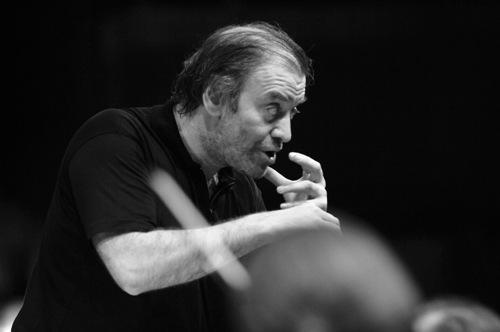Heavy-goods vehicles stacked with lamentations have been thundering through the Barbican Hall. Saturday's lugubrious Rachmaninov found a mid-20th-century counterpart last night in the tough elegies of Shostakovich's First Violin Concerto - apt for a dedication to those affected by the Japanese earthquake. And the tottering juggernaut of not-quite-great-but-living Russian composer Rodion Shchedrin still clogs the LSO's current season, fortunately in this case only to head a procession ending in the carnival float of what should have been Tchaikovsky's springiest symphony.
Well, the Gergiev approach is much the same as ever: vividly detailed, sometimes illuminatingly phrased but always landing a punch or two too many in the claustrophobic-sounding ring of the Barbican Hall. I wonder, for example, whose interpretation of Shostakovich's already massive concerto this really was: didn't the usually spacious and philosophical Leonidas Kavakos find himself swept along in the driven approach to the great central Passacaglia when it could have been so much more the breathing heart of the work? As for the grey-into-silver Nocturne which so testingly launches the concerto, I'd better confess that its long line of pain was hard to judge from where I was sitting: in a hall unusually thrumming on this occasion with a thousand uncovered coughs, my neighbour seemed to have Tourette's of the throat, which meant a clearing signal every 20 seconds or so (and the possibility of a medical condition which stopped me asking him if he was aware of it). It couldn't have distracted Kavakos from that distance, but it did mean that the hushed concentration which is all in this music couldn't work its spell on me. And the audience wasn't playing the necessary role of attentive collective listener - or not, at least, until the later stages.
It may also be that this of all concertos ought to be an occasional memorial one hears only once every couple of years, like the same composer's Eighth Symphony or Britten's War Requiem; yet concert programmes are rife with it, and this performance didn't seem to me to have the truly cumulative aura of Julia Fischer's riveting Proms performance. That said, no one could have played the crucially placed and ever so gradually gearing-up cadenza with greater purity of tone or intensity of expression than Kavakos, nor carried it through so tirelessly to the final cannonade of a whirlwind finale. Good too, to see him so warmly embraced by an obviously stunned LSO leader, Roman Simovic. It's just that I was expecting a Hamlet of mature reflection from the violinist who earlier this year gave the greatest duo concert (with Enrico Pace) I think I've ever heard, rather than an adolescent-virtuoso prince.
Certainly the handsome-sounding but dead-behind-the-eyes rhetoric of the opening flourish, Shchedrin's Lithuanian Saga, was quickly forgotten in the face of Shostakovich's Olympian threnodies and symphonic dances. You might argue that this fresco for Vilnius, 2009 European Capital of Culture, was only ever intended as an attention-seeking prelude. It succeeded on two counts - grabbing us by the throats at the start and proceeding with original orchestral detail, not just in the chromatic rolls of the timpani but also in the harsh voices of muted trumpets added to woodwind choruses - but failed on the third one of memorable substance, peeling away the pomp of battlefield chant to yield only empty wastes.
Tchaikovsky's ideas are stacked high and unfurled with a master's touch in the condensed revision he made of his initially sprawling Second Symphony. There was atmosphere in the opening horn solo - sorry, I was still trying to ignore those throat-clearings but failed, counting three in two phrases - but only surface thrust thereafter, with just a little of the typical Gergievian lift to brief lyric respite, and hazardous co-ordination in the Beethoven-like insistence of the first big development. Clarinets and bassoon were encouraged to conduct the wedding-march quaintness of the second movement more like a hushed miniature funeral, and the folk-melodic charm of its centrepiece went for little; the scherzo was thunderous - mega-symphonic Beethoven again - but short on loveable eccentricity, and the high-kicking variations of Tchaikovsky's finale had point and style, but never a moment to breathe or beguile. Surely the composer himself would never have claimed profundity for this relatively early homage to his fellow musical nationalists, but it has more of a soul than Gergiev cared to reveal. And after a heavily presented couple of Barbican concerts, I feel badly in need of fresh air.
- Gergiev, Kavakos and the LSO repeat this programme at the Barbican tonight (Thursday, 24 March)
- Further details of the rest of the LSO's season













Add comment